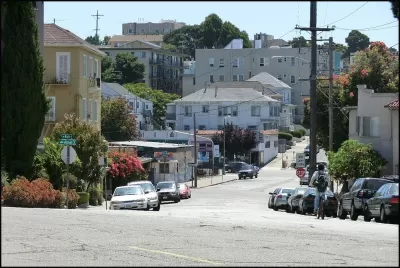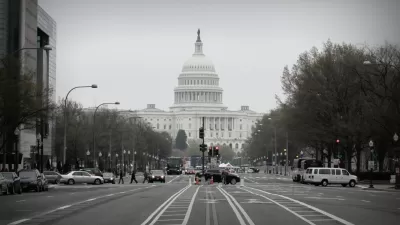The city of Oakland in the East Bay Area is a hotbed of planning and development issues, most notably gentrification and the displacement of communities of color. Now the city is considering a drastic change to its zoning code.

"The Oakland City Council voted unanimously Tuesday to look into allowing four-unit apartment buildings to be built across the city, including in neighborhoods that currently only allow single-family homes," reports Natalie Orenstein.
The action by the Oakland City Council follows shortly after a similar decision by neighboring city of Berkeley, the latter of which has the distinction of being the first U.S. city to implement single-family zoning. A Berkeley City Council vote in February 2021 sets the city on a course to eventually eliminate single-family zoning throughout the city.
In Oakland's case, the vote means city planners will be tasked with studying the implications of changing the city's zoning laws, as well as proposing ideas for preventing displacement caused by any potential changes.
According to Orenstein, Oakland is a little bit of an outlier when it comes to the connections between land use regulation and demographics. "UC Berkeley’s Othering & Belonging institute recently found that Bay Area cities with higher proportions of their neighborhoods zoned for single-family houses still tend to be disproportionately white and less diverse than the Bay Area as a whole," explains Orenstein. "But in Oakland, many low-income neighborhoods with mostly residents of color are also zoned for single-family homes only."
The ordinance approved by the City Council this week asks planners to focus the development of four-plexes in "high-resource" areas, "typically wealthier neighborhoods with amenities that can be inaccessible to poorer residents."
More details on the political debate that surrounded the vote, as well as the specific context informing the debate, are included in the source article.
FULL STORY: Oakland takes a step toward banning single-family zoning

Maui's Vacation Rental Debate Turns Ugly
Verbal attacks, misinformation campaigns and fistfights plague a high-stakes debate to convert thousands of vacation rentals into long-term housing.

Planetizen Federal Action Tracker
A weekly monitor of how Trump’s orders and actions are impacting planners and planning in America.

In Urban Planning, AI Prompting Could be the New Design Thinking
Creativity has long been key to great urban design. What if we see AI as our new creative partner?

King County Supportive Housing Program Offers Hope for Unhoused Residents
The county is taking a ‘Housing First’ approach that prioritizes getting people into housing, then offering wraparound supportive services.

Researchers Use AI to Get Clearer Picture of US Housing
Analysts are using artificial intelligence to supercharge their research by allowing them to comb through data faster. Though these AI tools can be error prone, they save time and housing researchers are optimistic about the future.

Making Shared Micromobility More Inclusive
Cities and shared mobility system operators can do more to include people with disabilities in planning and operations, per a new report.
Urban Design for Planners 1: Software Tools
This six-course series explores essential urban design concepts using open source software and equips planners with the tools they need to participate fully in the urban design process.
Planning for Universal Design
Learn the tools for implementing Universal Design in planning regulations.
planning NEXT
Appalachian Highlands Housing Partners
Mpact (founded as Rail~Volution)
City of Camden Redevelopment Agency
City of Astoria
City of Portland
City of Laramie





























